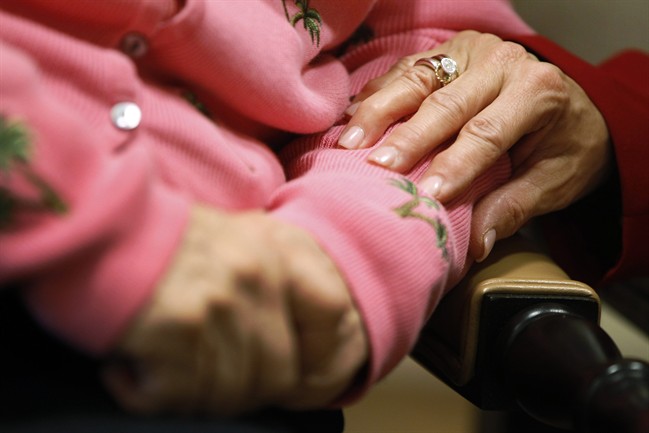OTTAWA – Two rare but serious side effects have been added to the prescribing information for the Alzheimer’s drug donepezil, Health Canada said Wednesday.

The prescription medication has been linked to a muscle breakdown called rhabdomyolysis and the neurological disorder NMS (neuroleptic malignant syndrome) in some patients.
Donepezil, sold under the brand names Aricept and Aricept RDT as well as generic equivalents, is used to treat the symptoms of mild to severe Alzheimer’s disease.
READ MORE: Why docs say these mood changes are a warning sign for Alzheimer’s
Rhabdomyolysis is a rare condition involving the breakdown of muscle tissue, which can cause serious and sometimes fatal abnormal heart rhythms, kidney damage and kidney failure. However, it is generally treatable if recognized promptly.
NMS is an extremely rare, life-threatening disorder characterized by a chemical imbalance that affects the nervous, muscular and cardiovascular systems. The muscular effects of NMS can sometimes lead to rhabdomyolysis.
“If symptoms of rhabdomyolysis or NMS are noticed, donepezil should be stopped immediately and a doctor or a pharmacist should be contacted right away,” Health Canada said in an advisory.
READ MORE: 10 warning signs of Alzheimer’s disease
“Symptoms of rhabdomyolysis include a combination of fever, muscle or joint pain, weakness, nausea, and dark (tea-like) urine. Symptoms of NMS include high fever, muscle stiffness or rigidity, mental changes including delirium and agitation, and irregular heartbeat and pulse.”
- Buzz kill? Gen Z less interested in coffee than older Canadians, survey shows
- ‘She gets to be 10’: Ontario child’s heart donated to girl the same age
- Bird flu risk to humans an ‘enormous concern,’ WHO says. Here’s what to know
- Canada updating sperm donor screening criteria for men who have sex with men
Health Canada said that before prescribing the drug, health professionals should assess patients for risk factors for rhabdomyolysis. They include muscular disorders, uncontrolled hypothyroidism (underactive thyroid) and liver or kidney damage.
The risk could also be increased if a patient is taking another medication known to cause rhabdomyolysis, among them statins to lower cholesterol, antipsychotics, and certain antidepressants known as SSRIs and SNRIs.
READ MORE: Women make up 72 per cent of Alzheimer’s patients
The new warnings follow a Health Canada safety review of the drug.
Rhabdomyolysis and NMS were reported to occur independently with donepezil use. But the muscle disorder may also be a complication of NMS — it was most often reported when donepezil therapy was started or the dose increased.
As of mid-2014, Health Canada had received one report in Canada of rhabdomyolysis possibly related to donepezil, in a patient who recovered. There had been no Canadian cases of NMS reported with the drug.
READ MORE: What are the early warning signs and symptoms of dementia?
Internationally, there were 88 cases of rhabdomyolysis and 67 cases of NMS linked with donepezil, with some patients having both conditions. Three deaths were associated with rhabdomyolysis and nine deaths with NMS, most of them in Japan.



Comments